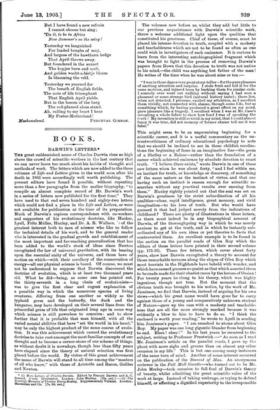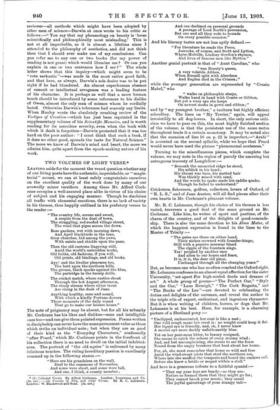BOOKS.
DARWIN'S LETTERS.* TIE great unblemished name of Charles Darwin rises so high above the crowd of scientific workers in the last century that we can never learn too much about his habits of thought and methods of work. The letters which are now added to the three volumes of Life and Letters given to the world soon after his death in 1882 were accordingly well worth publishing. The present editors have found it possible, without repeating more than a few paragraphs from the earlier biography, " to compile an almost complete record of Mr. Darwin's work in a series of letters now published for the first time." They have used to that end seven hundred and eighty-two letters which could not find a place in the Life and Letters, or were not available for publication at the time of its preparation. Much of Darwin's copious correspondence with co-workers and supporters of his evolutionary doctrine, like Hooker, Lyell, Fritz Miller, Huxley, and Dr. A. R. Wallace, • ii of the greatest interest both to men of science who like to follow the technical details of his work, and to the general reader who is interested in the gradual growth and establishment of the most important and far-reaching generalisation that has been added to the world's stock of ideas since Newton excogitated the law of universal gravitation, with its bearing upon the essential unity of the universe, and those laws of motion on which—with their corollary of the conservation of energy—all our physical science is based. Of course, we must not be understood to suppose that Darwin discovered the doctrine of evolution, which is at least two thousand years old. What he did—being, as some one has pointed out, the thirty-seventh in a long chain of evolutionists— was to give the first clear and cogent explanation of a possible way in which the numerous species of living creatures, differing from one another as widely as the typhoid germ and the butterfly, the duck and the kangaroo, may have developed on their several lines from the primordial germ of life that originated long ago in some way which science is still powerless to conceive : and to show further that it is probable that man himself, with all the varied mental abilities that have " set the world in his heart," may be only the highest product of the same course of evolu- tion. It was this achievement which caused the evolutionary doctrine to take root amongst the most familiar concepts of our thought and to become a corner-stone of our scheme of things, as without doubt it is nowadays, though leas than fifty years have elapsed since the theory of natural selection was first placed before the world. By virtue of this great achievement the name of Darwin will stand to all time among the "masters of all who know," with those of Aristotle and Bacon, Galileo and Newton.
• (1) More Letters of Charles Darwin. Edited by Francis Darwin and A. C. Seward. 2 vols. Illustrated. London: John Murray. [32s. net.]—(2) The Scielstifte Memoirs of Thomas Henry Sudsy. Supplementary Volume. London: Macmillan and Co. [7e. 6d. net.]
The volumes now before us, whilst they add but little to our previous acquaintance with Darwin's scientific work, throw a welcome additional light upon the qualities that constituted his greatness. Chief of these, of course, must be placed his intense devotion to truth, coupled with a modesty and teachableness which are not to be found as often as one could wish in investigators of such eminence. It is curious to learn from the interesting autobiographical fragment which was brought to light in the process of removing Darwin's papers from Down that this devotion to truth was not native to his mind,—the child was anything but father of the man !
He writes of the time when he was about nine or ten
"I was in those days a very great story-teller—for the pure pleasure of exciting attention and surprise. I stole fruit and hid it for the same motives, and injured trees by barking them for similar ends. I scarcely ever went out walking without saying I had seen a pheasant or some strange bird (natural history taste) ; these lies, when not detected, I presume, excited my attention, as I recollect them vividly, not connected with shame, though some I do, but as something which, by having produced a great effect on my mind, gave pleasure like a tragedy. I recollect when I was at Mr. Case's inventing a whole fabric to show how fond I was of speaking the truth ! My invention is still so vivid in my mind, that I could almost fancy it was true, did not memory of former shame tell me it was false."
This might seem to be an unpromising beginning for a scientific career, and it is a useful commentary on the un- trustworthiness of ordinary educational psychology to note that we should be inclined to see in these childish recollec- tions the beginning of fame in an imaginative line—the germ of a Shelley or a Balzac—rather than the foundation of a career which achieved eminence by absolute devotion to exact truth. " I believe there exists," wrote Darwin in one of these new letters when he was about forty, "and I feel within me, an instinct for truth, or knowledge or discovery, of something of the same nature as the instinct of virtue, and that our having such an instinct is reason enough for scientific re- searches without any practical results ever ensuing from them." Huxley rightly pointed out that the seal was set on Darwin's greatness by the strict subordination of all his qualities—clear, rapid intelligence, great memory, and vivid imagination—to his love of truth. But who would have guessed it that had judged merely from the indications of childhood P There are plenty of illustrations in these letters, as there must indeed be in any biographical account of Darwin, of the thoroughgoing way in which be was merely anxious to get at the truth, and in which he instantly sub- ordinated any of his own ideas or pet theories to facts that controverted them. An excellent example is to be found in the section on the parallel roads of Glen Roy which the editors of these letters have printed in their second volume (pp. 171-93). These few letters, which cover about forty years, show how Darwin excogitated a theory to account for those remarkable terraces along the slopes of Glen Roy which most tourists in the Highlands have beheld with wonder, and which have caused guesses so quaint as that which asserted them to be roads made for their chariot races by the heroes of Ossian ! For twenty years he clung to his theory, which was highly ingenious, though not true. But the moment that the obvious truth was brought to his notice, by the work of Mr, Jamieson, we find that Darwin, instead of arguing for his own views—which his great name would have gone far to carry against those of a young and comparatively unknown student of Nature—gave up the case with a modesty and teachable- ness that are all the more strongly marked because it was evidently a blow to him to have to do so. "I think the enclosed is worth your reading," he wrote to Lyell in sending him Jamieson's paper. "I am smashed to atoms about Glen Roy. My paper was one long gigantic blunder from beginning to end. Eheu! eheu! " In his last years he recurred to the subject, writing to Professor Prestwich :—" As soon as I read Mr. Jamieson's article on the parallel roads, I gave up the ghost with more sighs and groans than on almost any other occasion in my life." This is but one among many instances of the same turn of mind. Another of some interest occurred on the publication of the Descent of Man. An anonymous reviewer in the Pan Mall Gazette—who turned out to be Mr. John Morley—took occasion to fall foul of Darwin's theory of beauty, whilst admitting the great scientific value of the work at large. Instead of taking umbrage, or trying to defend himself, or affecting a dignified superiority to the irresponsible
reviewer—all methods which might have been adopted by other men of science—Darwin at once wrote to his critic as follows :—" You say that my phraseology on beauty is loose scientifically and philosophically most misleading.' This is not at all improbable, as it is almost a lifetime since I attended to the philosophy of aesthetics, and did not think then that I should ever make use of my conclusions. Can you refer me to any one or two books (for my power of reading is not great) which would illumine me ? Or can you explain in one or two sentences how I err ?" The whole letter shows that this inquiry—which might seem to be "rote sarkastic "—was made in the most entire good faith, and that here, as always, Darwin's sole desire was to be put right if he had blundered. An almost superhuman absence of conceit or intellectual arrogance was a leading feature of his character. It is perhaps as well that a more human touch should be introduced by some references to his dislike of Owen, almost the only man of science whom he cordially hated. Otherwise Darwin's tolerance had scarcely any limits. When Huxley wrote the absolutely crushing review of the Vestiges of Creation—which has just been reprinted in the supplementary volume of his Scientific Memoirs, and is worth reading for its merciless severity, even when the book with which it dealt is forgotten—Darwin protested that it was too hard on the poor author : " I must think that such a book, if it does no other good, spreads the taste for Natural Science." The more we know of Darwin's mind and heart, the more we admire him, quite apart from the epoch-making nature of his work.











































 Previous page
Previous page